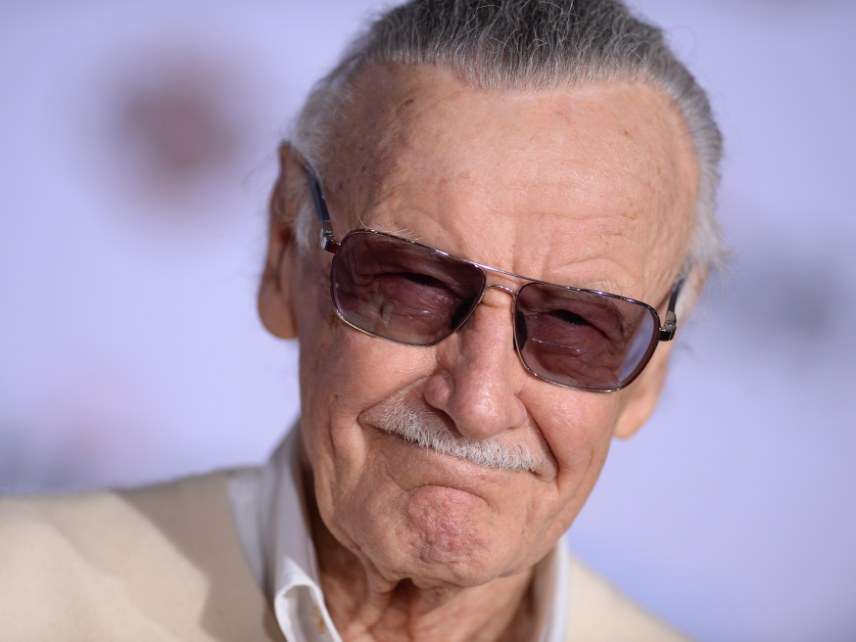Comics Giant Stan Lee Dead at 95
Marvel's former chief left behind a massive cultural legacy preaching tolerance and personal responsibility.

Stan Lee, a man who helped create some of Marvel's most popular and iconic superheroes, died today. He was 95.
Stan Lee was to Generation X kids (and even some older readers) what Walt Disney was to baby boomers. Though the foundation of Marvel's superhero stories and Lee's involvement with them took off in the 1950s and '60s before some GenXers were born, the industry saw a massive boom from the 1960s to the 1980s, as Lee moved up from writer and editor to publisher.
My own introduction to Lee was hearing his voice in the narration to the Saturday morning cartoon Spider-Man and His Amazing Friends in the early 1980s. That cartoon pushed me into comic books, and I was devoted Marvel reader for decades after that. (Funny side story here: I was initially drawn to the comics by the representation of Iceman in the cartoon, who stirred some very early recognitions of my sexuality. Iceman himself came out of the closet as gay in 2015.)
Lee, like Disney, openly embraced being the public face of Marvel, not just some behind-the-scenes business leader. As Marvel's superhero comics spread into other media, such as television and film, he became known for his amusing cameos.
Under Lee, Marvel's superheroes became more than awe-inspiring ubermen to be idolized. They became more like real people who young readers could relate to. The Fantastic Four were a family, with all the conflicts and storytelling those relationships entailed. Spider-Man was famously a coming-of-age comic for teens about the responsibilities of powers and adulthood.
Those Spider-Man stories are often credited with the line "With great power comes great responsibility." The saying probably predates the hero's 1962 origins by more than a century, but Lee's comics did lean heavily on the idea of personal responsibility to separate heroes from villains. And Marvel's heroes had a complicated relationship with government authority, with officials increasingly worrying that these powerful individuals could not be controlled and therefore were a threat.
We saw this play out in Spider-Man as newspaper editor J. Jonah Jameson constantly decried the young hero's "vigilante" actions. In the X-Men, whose heroes were born with their powers, the relationship between the heroes and the government became outright hostile (a dynamic that continues, off and on, to this day). Even the Avengers, as all-American as they were, often found themselves on the wrong side of the law. In the 1970s and beyond, the comics offered young readers stories where heroes operate outside the confines of government institutions to do good.
Marvel comics these days (now owned by Disney, in an interesting cultural development) gets some criticism for trying to appeal to younger demographics through obvious diversity inclusions—having Iceman come out as gay, having women (temporarily) play the role of Thor or Iron Man, and the like. But that's actually not a new thing. With Lee as a publisher, readers saw a black man (James Rhodes) take over as Iron Man for some time, and a black woman take on the mantle of Captain Marvel. X-Men villain Mystique was clearly coded as being in a romantic relationship with another woman, though the Comics Code prevented the book from actually saying so. The X-Men were an obvious metaphor about race relations, being treated with suspicion by the populace on the basis of birth qualities that they could not change. Later, in the 1980s and '90s, this morphed into a metaphor for anti-gay fears. In one comic in the 1980s, Professor Xavier was beaten nearly to death by a group of people who discovered he was secretly a mutant. Years later, a science-fictionized version of AIDS popped up that affected only mutants. Marvel's comics were always attuned to cultural developments of the time. (Not always for the better—as the war on drugs heated up in the '80s, they were there to help it along.)
The popularity of Marvel's comics under Lee made a movie empire an eventual certainty, even if his core audience had to grow into adulthood and special effects technology needed to improve dramatically (helped out by the very same people who read his comics as children). His heroes are the stars now of annual summer blockbusters, his role in culture as entrenched as Disney's was. Comic sales themselves are down from where they were in Lee's heydays, but the culture of the superhero is not going anywhere soon. Lee's role in making Marvel's comics into a cultural touchstone for multiple generations has made it a certainty.
From earlier this year: Brian Doherty explored the Objectivist attitudes of comics artist Steve Ditko. Ditko, who died in June, helped Lee create such characters as Spider-Man and Dr. Strange.
